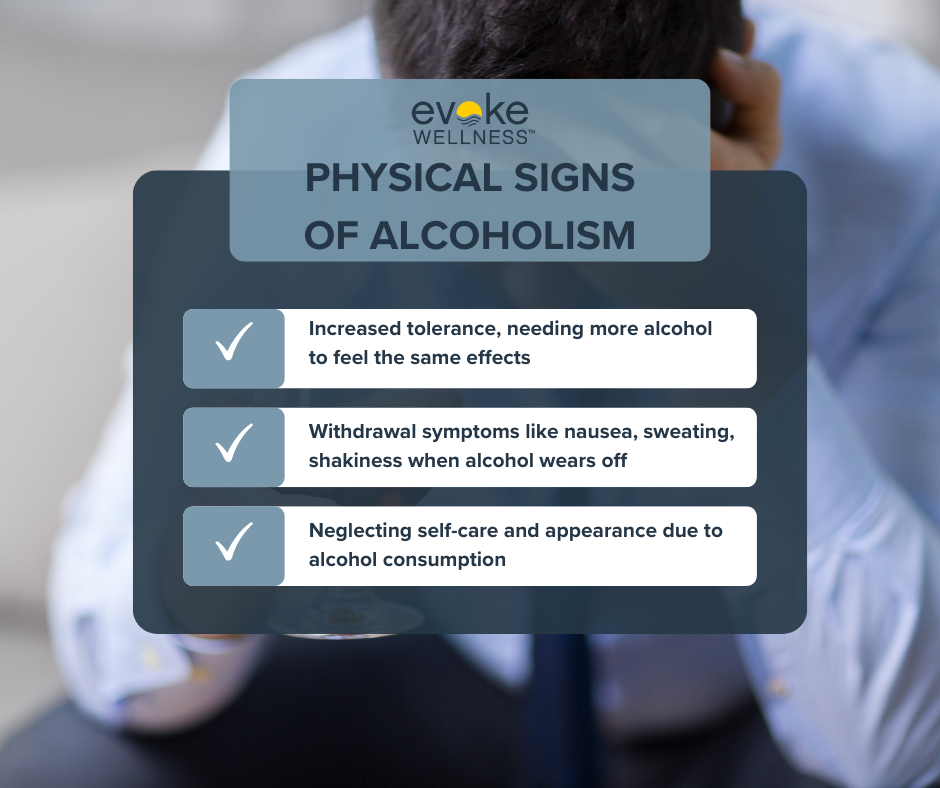Are you concerned about your own drinking habits or those of a loved one? Understanding the signs of alcohol use and abuse is crucial for early intervention and treatment. According to recent studies, over 14 million adults in the United States struggle with alcohol use disorder. This pervasive issue affects individuals from all walks of life, often developing gradually and subtly. In this article, you’ll learn to identify key indicators of problematic alcohol consumption and explore available treatment options, including drug and alcohol detox programs and comprehensive alcohol addiction treatment. By equipping yourself with this knowledge, you’ll be better prepared to address alcohol-related concerns and take the first steps toward recovery.
Together, let’s embrace the journey to recovery and the promise of a new beginning. Call us at (833) 819-6066 today or reach out online.
What are the five symptoms of alcoholism?
Alcohol abuse takes a heavy toll on the body. As tolerance builds, more alcohol is needed to achieve the desired effects. Withdrawal sets in when alcohol levels drop, causing unpleasant physical symptoms that drive further drinking. Over time, personal hygiene and overall health decline.

Behavioral Changes
- Difficulty controlling alcohol intake or failed attempts to quit
- Continuing to drink despite negative consequences on work, relationships, etc.
- Prioritizing alcohol over other interests and responsibilities
Signs of addiction include a loss of control over substance use, neglecting obligations, and persisting with the behavior despite interpersonal problems caused by drinking. Alcohol gradually becomes the main priority.
Psychological Symptoms
- Irritability, mood swings, and increased anxiety when not drinking
- Memory lapses or temporary blackouts from heavy alcohol use
- Isolation from friends/family to hide drinking habits
Alcoholism strains mental health, causing mood disturbances, cognitive impairment, and social withdrawal. These psychological effects often go unnoticed but steadily worsen over time with continued alcohol abuse.
If you recognize multiple signs from these categories, it may indicate an alcohol use disorder requiring professional treatment. Seeking help can prevent further damage and restore physical and mental well-being.
What are 4 indicators of alcohol dependence?
Physical and Behavioral Signs
Alcohol dependence is characterized by a range of physical and behavioral indicators. One key sign is impaired control over alcohol use – the inability to consistently abstain or control alcohol consumption despite a desire to cut back. Individuals may also experience social impairment, where alcohol use interferes with major obligations like work or school, and causes problems in personal relationships.
Risky Consumption Patterns
Another indicator is risky use – continuing to drink despite knowledge of persistent physical or psychological issues caused or exacerbated by alcohol. This disregard for negative consequences is a hallmark of dependence.
Tolerance and Withdrawal
Lastly, pharmacological factors like tolerance and withdrawal symptoms are strong signs of alcohol dependence. Tolerance means higher doses are required to achieve the desired effects. Withdrawal refers to unpleasant physical and psychological symptoms that occur when alcohol use is reduced or stopped, driving continued drinking to avoid discomfort.
Other potential indicators can include rapid weight changes, slurred speech, dilated pupils, nosebleeds, mood swings, irritability, and social withdrawal. Without treatment, alcohol dependence can severely impact physical and mental health.
Physical Signs and Symptoms of Alcohol Misuse
The effects of excessive alcohol consumption often manifest through distinct physical signs and symptoms. Early recognition of these warning signals can prompt timely intervention and support.
Visible Indicators
- Flushed complexion or reddening of the face
- Bloodshot or glassy eyes
- Slurred speech or incoherent communication
- Impaired coordination and unsteady gait
- Tremors or shakiness, especially in the hands
Physiological Responses
- Nausea, vomiting, or persistent gastrointestinal distress
- Frequent headaches or unexplained migraines
- Sleep disturbances, insomnia, or excessive drowsiness
- Increased tolerance, requiring more alcohol to achieve the same effects
- Withdrawal symptoms when alcohol consumption is reduced or stopped, such as sweating, anxiety, and tremors
Long-Term Health Consequences
Prolonged alcohol misuse can lead to severe and potentially life-threatening health issues, including:
- Liver disease, including cirrhosis and hepatitis
- Cardiovascular problems, such as high blood pressure and stroke risk
- Neurological impairments, including memory loss and cognitive decline
- Increased risk of certain cancers, such as breast, liver, and colon cancer
It’s crucial to seek professional help from addiction treatment centers like Evoke Wellness at Miramar, which offers comprehensive alcohol addiction treatment programs, including detox, inpatient rehabilitation, and ongoing support for sustained recovery.
Behavioral Signs and Symptoms of Alcohol Misuse
Personality Changes
When alcohol misuse becomes a pattern, you may notice significant personality shifts or mood swings. Someone struggling with alcoholism often becomes more irritable, angry, or depressed. Their behavior turns unpredictable as alcohol impairs judgment.
Neglecting Responsibilities
Alcohol addiction commonly leads to neglecting work, school, family, or social obligations. As stated by the National Institute on Alcohol Abuse and Alcoholism, a key sign is continuing to drink even when it causes issues fulfilling major duties.
Isolation and Secrecy
Those battling alcoholism tend to withdraw from loved ones and activities they once enjoyed. They may start drinking alone more often or try hiding their alcohol consumption. Lying about how much they drink is another common warning sign.
Alcohol Cravings
Intense cravings or a strong urge to drink can be a behavioral symptom, especially for those with a severe alcohol use disorder. According to a study published in Neuropsychopharmacology, brain imaging shows alcohol cravings originate in the insula and ventral striatum.
Risky Behaviors
Misusing alcohol impairs judgment, so you may notice risky behaviors like drunk driving, promiscuity, or getting into fights and arguments. Legal or financial troubles are potential consequences of alcohol-fueled poor choices.
If you recognize these signs in yourself or a loved one, alcohol addiction treatment programs like those at Evoke Wellness offer compassionate support through detox and evidence-based therapies. Early intervention gives the best chance at lasting recovery.
What is a high functioning alcoholic?
Outwardly Successful
While high-functioning alcoholics may seem to have their lives together from the outside, they are struggling with alcohol dependence behind closed doors. These individuals often hold steady jobs, maintain relationships, and keep up responsibilities – masking their excessive drinking habits.
Denial and Justification
High-functioning alcoholics tend to rationalize their drinking as a way to cope with stress or unwind after a long day. They may insist they only drink socially or can quit anytime. However, denial fuels a cycle of continued alcohol abuse despite negative consequences.
Physical and Mental Toll
Despite projecting an image of control, high-functioning alcoholics experience many of the same detrimental effects as other alcoholics. Increased health risks, strained relationships, legal troubles, and emotional distress often result from their alcohol dependence over time.
Seeking Help Is Key
Early intervention is crucial for high-functioning alcoholics before their alcohol abuse spirals further out of control. Addiction treatment programs offer comprehensive care through detox, therapy, and support for sustainable sobriety. Recognizing there is a problem is the first step.
What are the behaviors of alcohol abuse?
Neglected Hygiene and Appearance
One of the most noticeable behaviors of alcohol abuse is a lack of attention to personal hygiene and physical appearance. As alcohol addiction progresses, individuals may neglect basic self-care tasks like bathing, grooming, and maintaining a clean living environment. This neglect often stems from the all-consuming nature of the addiction, where obtaining and consuming alcohol becomes the primary focus. According to research, neglected hygiene is a common sign of alcohol abuse.
Dramatic Weight Changes
Alcohol abuse can lead to significant fluctuations in weight, either weight loss or gain. This is because alcohol is high in calories and can disrupt the body’s ability to properly absorb nutrients. Additionally, those struggling with alcoholism may skip meals or develop poor eating habits, leading to rapid weight loss. Conversely, the excessive caloric intake from alcohol can contribute to weight gain, especially when combined with a sedentary lifestyle.
Mood Swings and Erratic Behavior
Alcohol is a depressant that can profoundly impact mood and behavior. People abusing alcohol may exhibit sudden mood swings, ranging from euphoria to irritability, anger, or depression. They may also engage in erratic or risky behaviors that are out of character, such as aggressive outbursts, impulsive decision-making, or engaging in unsafe activities while under the influence. As noted, alcohol abuse can exacerbate mental health issues like schizophrenia, further contributing to mood disturbances and erratic behavior.
Possession of Alcohol Paraphernalia
Another telltale sign of alcohol abuse is the presence of alcohol-related paraphernalia, such as empty bottles, cans, or flasks, often hidden or stashed away. Individuals may also carry items like breath mints, eye drops, or mouthwash to mask the signs of drinking. Studies show that alcohol can act as a gateway to harder substances, increasing the risk of progressing to more severe forms of addiction.
Recognizing these behaviors is crucial for identifying alcohol abuse and seeking appropriate treatment. Evoke Wellness at Miramar offers comprehensive alcohol addiction treatment programs, combining evidence-based therapies, medical interventions, and holistic modalities to promote lasting recovery and improved overall well-being.
Signs Of Alcohol Use / Alcohol Abuse | drug and alcohol detox | alcohol addiction treatment program
Recognizing the Warning Signs
Alcohol abuse can have devastating consequences, impacting every aspect of an individual’s life. Identifying the warning signs is crucial for seeking timely intervention and support. Some common indicators include a persistent craving for alcohol, an inability to control consumption, and continuing to drink despite negative consequences. According to the National Institute on Alcohol Abuse and Alcoholism, approximately 14.5 million adults in the U.S. suffer from Alcohol Use Disorder (AUD).
Physical and Behavioral Symptoms
- Frequent hangovers or memory lapses
- Neglecting responsibilities at work, home, or school
- Engaging in risky or reckless behavior while under the influence
- Changes in appearance or poor hygiene
- Withdrawal symptoms like nausea, sweating, or tremors
Alcohol abuse often co-occurs with mental health conditions like depression or anxiety. Evoke Wellness at Miramar offers comprehensive dual diagnosis treatment, addressing both substance abuse and mental health disorders simultaneously.
Seeking Professional Help
Overcoming alcohol addiction requires a multifaceted approach, combining medical detox, evidence-based therapies, and ongoing support. Evoke Wellness provides a safe, structured environment for individuals to embark on their recovery journey. Their expert team utilizes techniques like Cognitive Behavioral Therapy (CBT) and Dialectical Behavior Therapy (DBT) to address the underlying issues fueling addiction.
The journey to sobriety can be challenging, but with the right support and guidance, lasting recovery is achievable. If you or a loved one is struggling with alcohol abuse, reach out to Evoke Wellness at Miramar today to take the first step towards a healthier, more fulfilling life.
Conclusion
In conclusion, recognizing the signs of alcohol use and abuse is crucial for early intervention and recovery. By understanding the physical, behavioral, and psychological indicators, you can take proactive steps to address problematic drinking patterns in yourself or loved ones. Remember that professional help is available through drug and alcohol detox programs and comprehensive alcohol addiction treatment. Recent studies show that seeking treatment can increase the likelihood of long-term sobriety by up to 60%. At Evoke Wellness at Miramar, our evidence-based approaches and compassionate care provide the support needed to overcome alcohol addiction and reclaim a healthy, fulfilling life. Don’t wait to seek help – take the first step towards recovery today.
Begin Your Journey with Evoke Wellness at Miramar
If you or a loved one is considering treatment, Evoke Wellness at Miramar invites you to contact us. Our compassionate team is ready to answer your questions, discuss your needs, and help you take the first steps toward recovery. In Miramar, you’ll find more than just a treatment program – you’ll discover a community dedicated to your wellness and success. Together, let’s embrace the journey to recovery and the promise of a new beginning. Call us at (833) 819-6066 today or reach out online.


